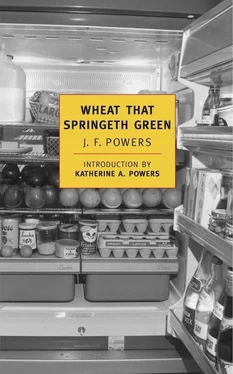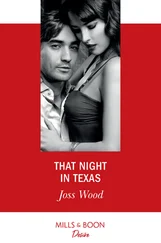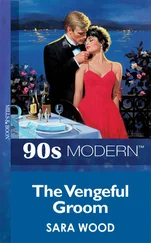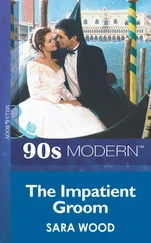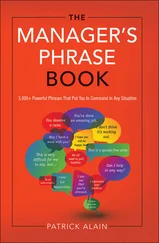J. Powers - Wheat That Springeth Green
Здесь есть возможность читать онлайн «J. Powers - Wheat That Springeth Green» весь текст электронной книги совершенно бесплатно (целиком полную версию без сокращений). В некоторых случаях можно слушать аудио, скачать через торрент в формате fb2 и присутствует краткое содержание. Год выпуска: 2000, Издательство: NYRB Classics, Жанр: Современная проза, на английском языке. Описание произведения, (предисловие) а так же отзывы посетителей доступны на портале библиотеки ЛибКат.
- Название:Wheat That Springeth Green
- Автор:
- Издательство:NYRB Classics
- Жанр:
- Год:2000
- ISBN:нет данных
- Рейтинг книги:5 / 5. Голосов: 1
-
Избранное:Добавить в избранное
- Отзывы:
-
Ваша оценка:
- 100
- 1
- 2
- 3
- 4
- 5
Wheat That Springeth Green: краткое содержание, описание и аннотация
Предлагаем к чтению аннотацию, описание, краткое содержание или предисловие (зависит от того, что написал сам автор книги «Wheat That Springeth Green»). Если вы не нашли необходимую информацию о книге — напишите в комментариях, мы постараемся отыскать её.
Wheat That Springeth Green — читать онлайн бесплатно полную книгу (весь текст) целиком
Ниже представлен текст книги, разбитый по страницам. Система сохранения места последней прочитанной страницы, позволяет с удобством читать онлайн бесплатно книгу «Wheat That Springeth Green», без необходимости каждый раз заново искать на чём Вы остановились. Поставьте закладку, и сможете в любой момент перейти на страницу, на которой закончили чтение.
Интервал:
Закладка:
“ Piss Pants! ”
Delbert Freeman didn’t hear it, but Sister Martina did and yelled:
“On your mark, get set, go!”
Joe broke fast and — he’d been in sack races before — watched out for early fallers. When he was clear, he eased up some to save himself for the stretch, concentrated on his sack, jockeying it, grabbing it up when he jumped, letting it out when he came down. (The noises from the crowd, the screams and groans, were not for him.) Lying third, breezing, gaining on the big seventh-grade girl who looked like Powerful Katinka in Toonerville Folks whose movements were erratic and might bring her (and him) down, he gave her more room, lost a little ground, gained it back, drew even, passed her. (Now the noises from the crowd were for him, cheering him on.) Closing on the leader, a big eighth-grade guy who smoked Wings (ten cents a pack) in the boys’ washroom during recess and might not stay, Joe drew even, and was going ahead in the stretch, driving, when he fell.
“His old man’s a bootlegger!” Delbert Freeman.
“His uncle !” Catfish.
Joe jumped up and out of his sack. He was heading not for Catfish but Delbert Freeman when, seeing and hearing Sister Agatha (“Joe, don’t !”), he changed directions… and ran away… all the way home, where he went up to the little tower and did what he’d wanted to do all that day, cried.
3. LOOKING UP SKIRTS
AT THE LAST meet that spring, Joe won his events, the hundred and the two-twenty dashes, and ran anchor in the four-forty relay, won by the team. But then, because the team’s second best distance man had twisted an ankle in the broad jump, Joe — against the conscience of his coach, Father “Germany” Zahn, an old dash man — was entered in the mile . After setting a pace intended to tempt and kill off the opposition, he faded as expected, but miraculously came again and got up for a third, a point, which proved to be the margin of Immaculata’s victory over hated Cathedral.
Joe was a hero to the faculty and student body for what remained of the school year — not much, summer vacation depriving the track star, as it didn’t the football and basketball star, of his admirers all too soon. But Joe had lettered in a major sport as a sophomore, something seldom done at Immaculata, where standards were high, and he made the most of it, wearing his sweater of pale blue with its snow white I as long as the weather permitted, or a little longer — he was hoping for an unseasonably cool summer. And was looking forward to fall and football because, though he didn’t care for the game and was small for it, Immaculata could use his blazing speed in the backfield — the head football coach, Father “On” Wisconski, present at the last meet, had been heard to remark (by the student manager of the track team, one of Joe’s admirers), “I’d like to turn that little fart loose on Cathedral.”
With that in mind, Joe was in training that summer. Instead of sharpening pencils and practicing his typing at Hackett’s, he stayed home and cut the grass, about two acres of it, with a hand mower, weeded the flower beds, practiced fast starts and broken field running, did push-ups, chinned himself on the apple tree, and ate a lot.
By July, though, it had become one of those summers that melt the streets, and Joe was spending more time in the cool of the cellarway. Here, in a deck chair, he read the Sporting News regularly, keeping track of players he’d seen before they went up to the majors, or after they came down; also read Anthony Adverse , a very long book, regularly; and occasionally dipped into Butler’s Lives of the Saints and Rumble and Carty’s Radio Replies , this (a gift from Sister Agatha, now stationed in Green Bay) answering questions he might be asked by the laity or enemies of the Church if he became a priest, which he wasn’t sure about that summer.
Early in July, when the heat had reached into the bricks of the cellarway and was wilting the moss, he said good-bye to the horseflies and moved the deck chair inside, into the cellar, and shut the door. Here, sitting under a dusty lightbulb, he smoked (English Ovals, exhaling into the open furnace to avoid detection) and drank (beer and ale, there being, or having been, a good supply in the cellar). Here he discovered what, until that summer, had been a mystery to him, why some stars stay out all night, experienced himself the special pleasure, the thrill, there is for the athlete in dissipation, in tempting fate — imagined himself in the fall (“ Fumble! ”) being taken out, hooted at.
And while smoking and drinking away these days in the cellar, abusing his body, he also abused his mind and spirit with the little magazines he bought with embarrassment at a downtown cigar store, to which he’d return for more of the same, he knew, though regularly disappointed by the art (“Pensive,” “Nocturne”) and the fiction (“Concealed from the other merrymakers by a potted palm while the band played on, Randy cupped one of Diane’s creamy cherry-tipped orbs”).
He couldn’t trust himself these days.
If he suddenly shoved his reading matter into the furnace and rushed out into the heat of the day, it might appear that he’d suddenly resolved to amend his life and that he just happened to be occupied in the front yard, moving the sprinklers, raking the gravel driveway, for a brief period in the morning and afternoon. The truth was, his reading matter could be retrieved from the cold furnace and he’d availed himself of the trial offer made to adults only for a limited time only by Seemore Products of Hollywood, to be dispatched to addressee in a plain brown envelope posthaste. Weeks had passed since addressee enclosed a dollar and signed himself J. Hackett — not such a good idea as he’d thought, since it meant meeting the mailman twice a day if the uncensored poses (“Kind Men Like! Nuff Sed!!”) weren’t to fall into the hands of the other J. Hackett at that address. Write and say that Seemore should cancel his order and give the money to the poor? Or that he’d moved to a nonexistent address in a distant city? Or that he’d recently married and was no longer interested? Or that he’d recently passed away, yours truly, Mrs J. Hackett?
It didn’t just happen, either, that he’d be occupied in the backyard when Frances and Dora, the new maid (over twenty-one and built like a brick… as the guys at Hedblad’s service station would say and Joe wouldn’t, even there), came out to sunbathe by the stone wall — on which a friendly young neighbor, as he might appear to be, though seldom speaking or spoken to, would soon be leaning, with an erection, considering the possibilities in the bodies below and sometimes in the conversation.
When Dora said, as she frequently did, “Rex, he don’t care if I go out with other parties, just so’s I don’t go steady, and I don’t care, just so’s he don’t,” Frances seemed to understand. But Joe wondered about this, since Rex and Dora (she seemed to meet these other parties while working at her other job, relief cashier at the Orpheum and the Palace) were engaged and planning to get married right after Rex had done his hitch. Joe also wondered about the property that Rex and Dora were hoping to buy with his winnings (craps) and her savings, which Joe thought could not amount to much. Dora called the property (“propitty”), which was in “easy reach” of Fort Bone, where Rex was stationed, a roadhouse — something Joe knew little about, only what he’d learned from his reading that summer (Randy had met Diane at a roadhouse, the Red Rooster) and from movies in which babes in high silk hats and black silk tights sold cigarettes to merrymakers at small tables with bed lamps on them. Joe thought that some of the places he heard swing music emanating from on his radio late at night, places like “Frank Dailey’s Meadowbrook” and “the beautiful Glen Island Casino,” might be roadhouses, real ones, but that what Rex and Dora had in mind was only a highway tavern with a name like Dew (or Do) Drop Inn stenciled on a beer sign. Even that was putting it too high, Joe thought when he heard that Rex would tend bar and keep order there while Dora kept order among the hostesses and doubled as one of them on busy nights, at least until the roadhouse got on its feet. “It won’t take long. Rex says we’ll be chargin’ a dollar for a ten-cent bottle of beer, and maybe more after hours. All his old buddies’ll come.”
Читать дальшеИнтервал:
Закладка:
Похожие книги на «Wheat That Springeth Green»
Представляем Вашему вниманию похожие книги на «Wheat That Springeth Green» списком для выбора. Мы отобрали схожую по названию и смыслу литературу в надежде предоставить читателям больше вариантов отыскать новые, интересные, ещё непрочитанные произведения.
Обсуждение, отзывы о книге «Wheat That Springeth Green» и просто собственные мнения читателей. Оставьте ваши комментарии, напишите, что Вы думаете о произведении, его смысле или главных героях. Укажите что конкретно понравилось, а что нет, и почему Вы так считаете.
